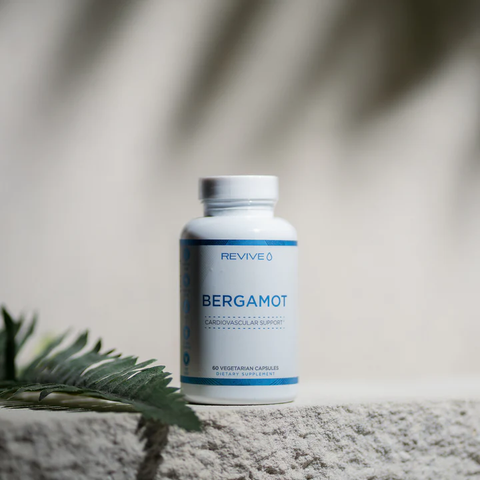The Best Bergamot Supplement for Cholesterol
If you’ve been searching for the perfect bergamot supplement, then you’re in luck — Revive MD offers the best bergamot supplement for cholesterol around. At last, your search is over! If you don’t believe us, stick around, and we’ll tell you why Revive’s bergamot supplement is the best supplement for cholesterol (and for your health in general).
If you stumbled upon this article because you’re wondering what, exactly, bergamot is, we’ll be going over that as well. Not many people know how important it is to take a bergamot supplement. Bergamot isn’t just for maintaining healthy levels of cholesterol; it’s also great for cardiovascular health and can be used for issues like anxiety and joint pain as well.
In this comprehensive guide, we’ll be answering all of your questions about taking a bergamot supplement for cholesterol. If you have high cholesterol or simply want to keep your cholesterol levels healthy, you should seriously consider taking a bergamot supplement alongside any other supplements you might be taking. Let’s get started, shall we?

What Are the Benefits of Bergamot Supplements?
Bergamot is a type of citrus fruit that’s mainly found in southern Italy. Using an Italian citrus bergamot supplement might help to reduce inflammation, lower your blood sugar levels, and prevent heart disease, which is great news. Citrus fruits, like bergamot, contain flavonoids, which improve the body's defenses and support heart health.
Bergamot also tends to be full of antioxidants and anti-inflammatory characteristics, which is why people often take bergamot supplements for the purpose of keeping their cholesterol levels healthy. Before we get into the best bergamot supplement for cholesterol, let’s talk about the main benefits of taking bergamot supplements in more detail below:
Reduces cholesterol
Research shows that bergamot could be beneficial in lowering fats in the body, as well as reducing the risk of heart disease.
In one study, it was determined that regularly taking a supplement made from a concentrated form of polyphenols found in bergamot (called BPF) led to decreases in overall cholesterol, LDL (often referred to as "bad" cholesterol), and triglycerides, while also improving HDL (known as "good" cholesterol).
To elaborate, BPF is a substance made from the juice and inner part of bergamot, which contains high amounts of polyphenols. Further studies suggest that when bergamot phyto, combined with artichoke leaf extract, is used, it results in similar reductions in cholesterol levels, along with shrinking waist size and fat deposits in overweight adults.
For this reason, it’s generally recommended to take bergamot supplements alongside other supplements (while eating a balanced diet, of course). We love supplements, but your body is not built to survive on supplements alone — that’s why they’re called supplements. Remember: a healthy diet and daily exercise are key. Even the best bergamot supplement is a complement to, not a replacement for, those foundations.
Reduces inflammation
Taking bergamot supplements might also help to reduce inflammation within the body. One study examined how bergamot affects inflammation in mice. The results showed that when mice were given bergamot juice every day, they displayed fewer signs of inflammation.
The researchers were able to conclude that bergamot's anti-inflammatory properties could potentially help treat conditions like inflammatory bowel disease. However, there isn't quite enough evidence that bergamot has the same anti-inflammatory effects in humans as it does in mice.
Still, though, if you do have issues with inflammation, taking a bergamot supplement certainly can’t hurt!
Supports Healthy Blood Sugar
Bergamot plays a role in supporting balanced blood sugar levels. It helps your body use insulin more effectively, making it easier to maintain steady glucose levels throughout the day. If you’re keeping an eye on metabolic health, this is another reason bergamot earns a spot on the shelf.
Promotes Heart Health
Bergamot doesn’t just help with cholesterol; it supports your entire cardiovascular system. From improved circulation to helping keep your blood vessels functioning properly, bergamot is like a little boost for your heart, working quietly but effectively in the background.
Provides Antioxidant Protection
Bergamot is naturally rich in antioxidants, especially flavonoids, which help protect your cells from oxidative stress. These compounds work behind the scenes, defending your body from the kind of cellular damage that can build up over time. Think of it as an internal clean-up crew, working to keep things running smoothly.
Provides Antioxidant Protection
Did you know that bergamot is a common ingredient in several aromatherapy oils? There’s a reason for this. Research shows that using bergamot orange aromatherapy might be useful for easing anxiety before specific medical procedures, like surgery, for example.
Its sweet and calming smell might have something to do with this, but we suspect that it goes deeper than that.
As mentioned previously, bergamot is great for your cardiovascular health. The heart and the mind are inseparable, after all. In order to have a healthy mind, you must have a healthy heart, and taking a bergamot supplement might just help you achieve exactly that.
Bergamot supplements support your entire cardiovascular system. From improved circulation to helping keep your blood vessels functioning properly, bergamot is like a little boost for your heart, working quietly but effectively in the background.

What Is Good Cholesterol?
Usually, we think of cholesterol as a bad thing. In the above section, we mentioned that taking bergamot supplements could potentially improve your HDL (or “good cholesterol”). If you’re wondering what this means, you’re not alone, and we’re here to give you some clarity on the matter.
Cholesterol is a substance that can be found in every cell within the body. It travels through the bloodstream with the help of proteins called lipoproteins. Among these lipoproteins, two types are particularly significant:
Low-density lipoprotein cholesterol (LDL)
Low-density lipoprotein cholesterol (LDL), often referred to as "bad" cholesterol, tends to gather in blood vessels. It increases the risk of blood clots, strokes, and heart attacks.
High-density lipoprotein cholesterol (HDL)
High-density lipoprotein cholesterol (HDL), known as "good" cholesterol, removes excess cholesterol from the blood and transports it to the liver for disposal. Higher levels of HDL are generally associated with a healthier heart and a lower risk of cardiovascular disease.
What If Your HDL Levels Are Low?
When your HDL levels are low, it may mean that you have a greater susceptibility to heart issues. Symptoms linked to low HDL cholesterol levels include mood swings, an enlarged liver or spleen, and distinctively colored tonsils, often seen in Tangier Disease — a genetic disorder that affects cholesterol processing.
How to improve your “good” cholesterol levels
Drink less alcohol
Everything in moderation, right? This is especially true when it comes to alcohol. While moderate alcohol intake has been linked to higher HDL levels, excessive drinking can lead to weight gain and elevated LDL cholesterol levels.
Quit smoking
Smoking not only lowers HDL cholesterol levels but also raises LDL cholesterol levels, which will very likely increase your risk of suffering from heart problems.
Exercise regularly
Engaging in regular physical activity, such as walking, for example, will help to raise HDL levels and promote a healthier cholesterol profile in general. Exercising regularly can also help you maintain a healthy weight, which can lower LDL levels and stimulate HDL production.
Eat a healthy diet
Adopting a heart-healthy diet is also super important when it comes to managing cholesterol levels. Choosing to eat unsaturated fats, fresh fruits, vegetables, and healthier oils can lower LDL levels.
Lose excess weight
If you're carrying extra weight, even modest weight loss can help increase HDL cholesterol. Shedding just 5–10% of your body weight has been shown to improve your lipid profile and reduce cardiovascular risk.
Limit added sugars and refined carbs
Too much sugar and refined carbohydrates, like white bread, pastries, and sugary drinks, can lower HDL levels and raise triglycerides. Cutting back on these can help restore balance and support healthier cholesterol numbers.
How Does Bergamot Help in Managing Cholesterol Levels?
Clinical trials suggest that Italian citrus bergamot is effective in managing cholesterol levels due to the fact that it contains polyphenolic flavonoids (plant-based antioxidants). Although more research is needed, it’s been implied that the effect of these flavonoids might be enough to allow people who are taking a statin drug to decrease their dose (without lowering the drug’s effectiveness, of course).
The concentrated bergamot extract used in these studies was in capsule form — just like Revive MD’s bergamot supplements. This is all good and well, but you should keep in mind that research, so far, hasn’t demonstrated that bergamot supplements, when taken alone, are more effective than statins when it comes to lowering bad cholesterol levels.
The Potential Side Effects of Using Bergamot Supplements
One of the most common questions people have about bergamot dietary supplements is: “Are there any side effects of using bergamot supplements?” While it’s rare for most users to experience side effects, it does happen — just like with any other type of medication. The potential mild side effects of using bergamot supplements include:
- Dizziness
- Heartburn
- Muscle cramps
- Sensitivity to light
- Nausea
When taking bergamot supplements, you should monitor your blood sugar and blood pressure closely, as bergamot could potentially lower blood sugar levels. If you’re pregnant or breastfeeding, you should ask your doctor before taking bergamot supplements.
Once again, we’d like to reiterate the fact that bergamot is quite safe. Still, though, it’s always better to be extra cautious than sorry!
What Is the Best Bergamot Supplement for Cholesterol?
When it comes to the best bergamot supplement for cholesterol, you can’t go wrong with Revive’s bergamot supplement. Revive MD’s Bergamot is a natural supplement that’s specially designed to improve heart health and keep cholesterol levels in check.
It's made from the bergamot citrus fruit, which contains plenty of flavonoids and polyphenols. These substances are packed with powerful antioxidants and anti-inflammatory properties that are great for your body.
Oh, and did we mention that it's gluten-free and vegan-friendly? We always want to make sure that our supplements are suitable for people with different dietary needs.
This bergamot supplement is specifically designed to help balance your cholesterol levels and provide extra support for your heart. What makes it unique is that it includes special ingredients, like AstraGin® and BioPerine®, both of which help your body absorb the supplement more effectively.
To use Revive’s bergamot supplement, simply take two veggie capsules with 8-12 ounces of water every day. You can do this anytime, so it’s just a matter of figuring out when to take the supplement to best fit your schedule. Some people like to take it in the morning, or directly after working out, to give you a few examples.
What makes Revive MD’s bergamot supplement stand out?
Needless to say, there are plenty of options out there when it comes to bergamot supplements for healthy cholesterol levels. Revive’s bergamot supplement stands out because of its unique ingredients.
The active ingredients in Revive's Bergamot supplement include Bergamot Orange Extract, which, as we’ve learned, is great for managing high cholesterol (and other health issues, like anxiety and joint discomfort).
AstraGin® is another special ingredient in this supplement that helps your body absorb nutrients more efficiently. This ingredient is especially important for maintaining a healthy gut!
Also included is BioPerine®, which is known for its ability to improve nutrient absorption. This means that you’ll get the most out of your bergamot supplement.

Start Improving Your Cholesterol With Revive’s Bergamot Supplements Today
When it comes to cholesterol control, high cholesterol remedies, and taking natural supplements (like bergamot supplements) for healthy cholesterol levels, just know that Revive MD has your back. Our supplements are made with the guidance of medical professionals, and they’re third-party purity tested, too!
Feel free to check out Revive’s bergamot supplement today! Of course, if you have any questions or concerns, you can always reach out to us at our website. We wish you the best of luck as you work towards more effective cholesterol management!
Frequently Asked Questions About Bergamot Supplements
How much bergamot should I take for cholesterol?
A common daily dose for cholesterol support is between 500 and 1,000 mg of standardized bergamot extract. Some people may be advised to take up to 1,500 mg per day, but larger amounts should only be used under the guidance of a healthcare provider. For best results, take your bergamot supplement consistently each day, ideally with food or about 20 to 30 minutes before a meal. This helps your body absorb it more effectively and may reduce the risk of any mild stomach discomfort.
How much bergamot should I take to lower cholesterol?
Bergamot isn’t a quick fix, but when taken daily, it may begin to support healthier cholesterol levels within about 2 to 3 months. During this time, it helps the body balance LDL (the “bad” cholesterol) and HDL (the “good” cholesterol), while also supporting overall cardiovascular function. After 60 to 90 days of consistent use, it’s helpful to review your cholesterol levels with your provider to see if it’s having the desired effect or if your plan needs adjusting.
Who should not take bergamot?
Bergamot supplements aren’t safe or appropriate for everyone. You should avoid taking bergamot if:
-
You are pregnant or breastfeeding, as its effects during pregnancy and lactation have not been well established.
-
You’re a child or teenager, some serious side effects, including seizures, have been reported in younger individuals when exposed to high amounts of bergamot.
-
You have diabetes or are preparing for surgery soon, since bergamot may lower blood sugar levels and could interfere with blood sugar management.
-
You take medications that increase sensitivity to sunlight, cholesterol-lowering drugs like statins, or any drugs processed by the liver through CYP3A4 enzymes—these may interact with bergamot and require medical guidance.
-
Consult with your doctor if you have sensitivity to sunlight, heart rhythm issues (bradycardia), glaucoma, or digestive issues. Bergamot may worsen your symptoms, so it's best to talk with a health professional before use.
Does bergamot interfere with sleep?
Bergamot extract taken in supplement form for cholesterol does not typically cause sleep problems. Most people take it during the day without any effect on their sleep at night. In fact, the essential oil form of bergamot is often used to promote calmness and is found in some products meant to help with relaxation. If you notice any changes in your sleep after starting bergamot, it’s a good idea to check in with your provider, but sleep disruption is not a common side effect.
Does bergamot help with weight loss?
Bergamot is not intended to be a weight-loss supplement. Its main benefit is in supporting heart health and maintaining healthy cholesterol and blood sugar levels. While better cholesterol balance and blood sugar control can play a role in supporting metabolic health, bergamot on its own won’t lead to significant weight loss. Sustainable weight management still comes down to factors like your diet, physical activity, sleep quality, and overall lifestyle.
The information being presented in this blog is intended to be used as educational or resource information only. It is not intended to be a substitute for medical advice from your healthcare provider. This content should not be used for the diagnosis or treatment of any medical condition. If you have any questions or concerns about your health, please contact your healthcare provider. You should call 911 for all medical emergencies. Revive MD is not liable for any advice or information provided on this blog, which advice or information is provided on an “as-is” basis, and assumes no liability for diagnosis, treatment, decisions, or actions made in reliance upon any advice or information contained on this blog. No warranties, express or implied, are made on the information that is provided.

